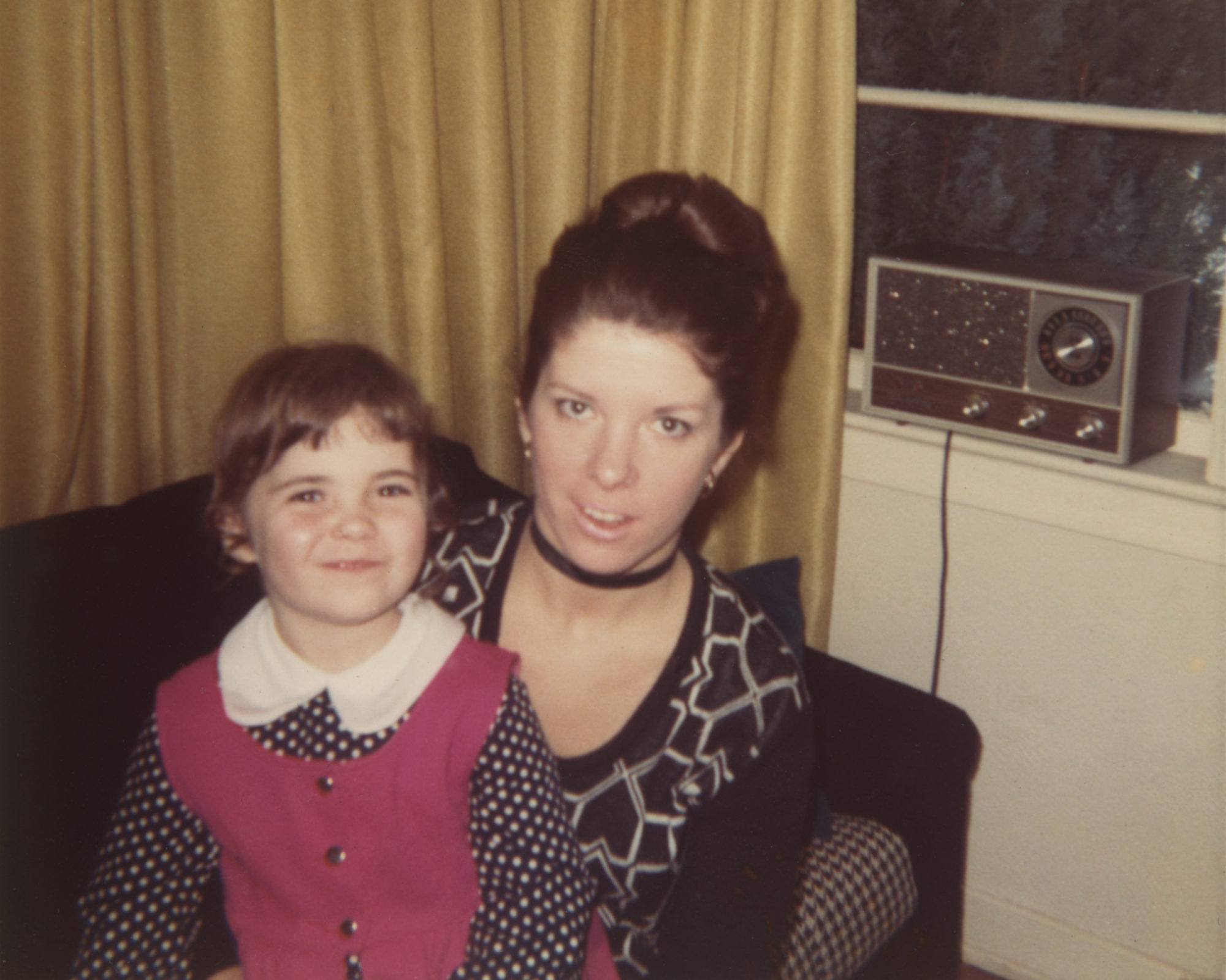“Upon landing in Tangiers, two officials approached me. They asked me for my passport and identification. I complied, giving my passport to one and my identification to the other. They then promptly ran off, one in either direction. †This is the story our skateboarder Brit host tells us within moments of arriving in the courtyard of his riad in Marrakesh.
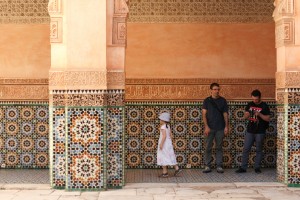
Above him birds sing in the Datura plant that cascades down from an upstairs balcony. The four of us sip sweet green tea with mint, taking in what seems a strange quiet after negotiating the streets outside. “But that didn’t scare you off. You’re still here,†I say. He laughs and nods, and with a hint of resignation, or is it uncertainty, he says, “Yes, I’m still here.†Shades of Heart of Darkness; I look around for heads on sticks.
Our son is seventeen, and our daughter six. Going to Morocco was part of a spring break trip. It was our son’s last year of school, so we were taking the opportunity to travel as a family before he headed off to work and university.
As was arranged online, we were met at the airport by Rachid. In a dilapidated Mercedes, he drove us through wide, sunny, palm tree lined walled avenues and into the Medina. Through the gates, the walls suddenly stepped in closer corralling everyone into winding and twisting narrow streets lined with vendors and small shops.
The police stopped our car. Rachid got out, papers in hand. Looking back over our shoulders we watched the interaction in silence. Cars and beeping motorcycles piled with families stopped and started and sped by. Donkeys plodded along like moving statues among the flow. Pedestrians, many wearing long robes with their heads covered in scarves or the pointed Jellaba hood, lined the roadway on either side. Our driver back in the car, we drove on, all sense of direction now lost to us, to where the car could go no farther. Our packs were then piled into a battered cart and pushed up an even narrower street still filled with pedestrians to a long quiet passageway where few passed us. It wound deep into the three story high buildings, some crumbling, and narrowed even more into a cool dark passageway lined with barely visible arched wooden doors, and there, at the very end, behind an ornately carved and painted door, was our riad.
We were charmed by the historical home. We loved the painted ceiling and tile work, the private sitting rooms, the rooftop on which to lounge and eat breakfast. However, it did not provide other meals. With kids in tow, the next meal was foremost on our minds. So after our tea, with a map tucked in each of our bags and our daughter’s contact info pouch slung around her neck, we ventured back out into the maze of the medina in quest of food. The most direct route to the main square and restaurants was the route of the locals. Senses peaked, our awareness full of new sights and sounds and everyday dangers we were yet unfamiliar with, motorcycles coming up fast behind us, cobblestones loose in the street, donkey carts to let by, we set out. We ate traditional tajine, a simple stew, in a tourist joint where the price of lunch was comparable to home and headed out to the square, Djemmaa el-Fna.
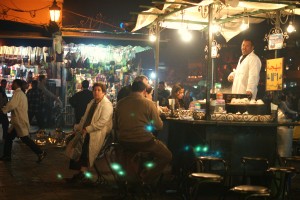
The sun blazed on the soot covered stones as we wove our way through the crowd. Men with chained skinny monkeys in dusty diapers aggressively demanded we take their picture. Women beckoned us for henna tattoos. Blankets with trinkets, crafts, ostrich eggs, argon oil, and a host of other obscure ingredients sat out in the sun for sale with vendors calling and approaching us to buy. We quickly learned that it was all about the eyes, and to look at things only with a quick sideways glance unless we were really interested in engaging, which, we nearly instantly decided, we were not. Of course, our daughter was unable to do this, and was harangued to buy the wooden snakes that were shoved to her face. I caught the splay of a cobra’s head in one of my furtive glances, something I’d been eager to see, but, in the context of the square, it just looked more sad than mysterious. I was ready to exit.
We’d read that Moroccan families toured Marrakesh in a horse and carriage. So we opted to do the same. A long line of drivers waited on a street that merged into the square. As we neared the line, we were approached by a man who looked more ready to fight us, and had the facial scars to prove it, than offer us a ride, and fight us he did, in a way, as we negotiated a price. He finally stepped away with a look of what seemed an inordinately disturbing level of disdain to let a young, bright faced man take over. He looked me in the eye and tossed us a broad smile. I felt much better about the possibility of piling my family into his carriage and encouraged Peter to hand over our money.
And though I expect that was how it was scripted to go in that interaction, we were to find in the following days that this was the way it was throughout the medina, where many people were very kind, others were decidedly not, and in fact could be downright combative. In one instance, I felt compelled to take on a mother bear role and move between my son and a man with a monkey who demanded my son take a picture of him. When my son had shaken his head in refusal the man had started lunging and swearing at him. Life was tough here, and clearly desperate for some.
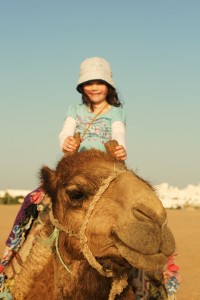
Lulled to sleep by the motion of the carriage and the heat, my daughter slumped down next to me as we left the square and the medina. For the rest of us, it was a surreal transition from mayhem to opulent order as we were taken away from the busy square to pass the high walls and guarded entry of the King Mohammed VI’s palace, one of a handful he maintains. Despite recent reforms the king remains one of the last remaining monarchs with vast executive powers over the country he rules, including the power to dissolve parliament. He is a man whose wealth has doubled since he came into power in 1999, which also makes him one of the richest monarch’s, and therefore one of the richest people, in the world.
“No pictures,†we were told, as my son raised his camera. And then we were at a roundabout. Water streamed from fountains; lush palm trees and gardens adorned stylish modern buildings all the same red ochre colour as the walls of the kings palace, then an outdoor café, a flash of opulence from the first world. One glance and I decided it was beyond even our middle-class Canadian budget. A European looking woman emerged from inside to sit on the patio with her daughter. Their experience of traveling with a child in Morocco was likely decidedly different than ours.
But this would change. Our next destination was the historical coastal town of Essaouira. We rode the bus through an arid landscape, dotted with small strips of all but crumbling villages, from which people eked out a most basic existence tending argon trees and raising goats. Roughly dressed pushers of the same battered carts that had carried our bags in the medina pressed us to hire them upon our arrival. Knowing we were only around the corner from our hotel, we complied. As we trudged up the dusty and broken, trash strewn street to the stairs of our hotel the rotund concierge smirked before composing himself and directing two bell hops to unload our bags. I smiled too. Surely not too many guests arrived to this hotel in such a manner, it was Le Medina, the best hotel in town, and I had booked us in at a fraction of the full rate. We were greeted with cool cloths and served the traditional tea, complete with the high lift of the tea pot, while we filled out our paperwork and caught glimpses of the pristine pool through the billowing curtains of the courtyard doors.
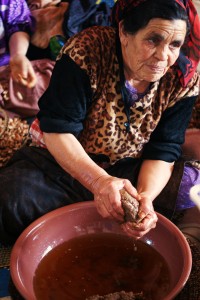
We spent our days in Essaouira swimming in the pool, wandering the ramparts, checking out the port busy with fishing boats, walking along the sea wall, and, for our daughter’s sake, taking the obligatory camel ride. We took walks through the medina, quiet and touristy at one end, bustling and decrepit at the other, and we delighted in listening for the static-filled background call to prayer. One afternoon we stretched the budget and had a long seafood lunch at a whitewashed rooftop restaurant with a spectacular panoramic view of the ocean and medina.
What we discovered in our brief excursion to this North African country is that Morocco is a land of two worlds. That many have headed to the streets to demand further reform does not surprise me, and that others have set themselves alight to protest their plight surely shows just how bad that disparity is. While reparation payments, trade, and tourism from a spiraling European economy dwindles, Morocco increasingly becomes the land of the very poor and the opulently wealthy. Go there, and be prepared to navigate that disparity.
